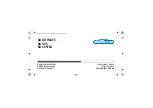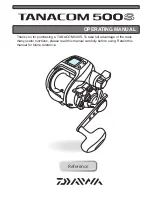
99-MAN 100319.v1 09/06
OPERATION
Making Measurements with the AC Current Probe Model MN127
•
Connect the black lead of the current probe to “common” and the red lead to the AC voltage range on
your DMM or other voltage measuring instrument. The “10A” range has an output signal of 1mV/mA
AC
.
This means that for 10A
AC
in a conductor around which the probe is clamped, 10V
AC
will come out of
the probe leads to your DMM or instrument. The “100A” range has an output signal of 1mV/A
AC
. This
means that for 100A
AC
in a conductor around which the probe is clamped, 100mV
AC
will come out of
the probe leads to your DMM or instrument. Select the range on your DMM or instrument which
corresponds best to the measured current. If the current magnitude is unknown, start with the highest
range first and work down until the appropriate range and resolution is reached. Clamp the probe
around the conductor. Take the reading on the meter and multiply it by the output signal used to obtain
the measured current. (e.g. If the meter reads 100.5mV [range 1mV/mA], then current equals
100.5mA
AC
). Unclamp the probe from the conductor before disconnecting it from your DMM or
instrument.
•
For best accuracy, avoid if possible, the proximity of other conductors which may create noise.
Tips for Making Precise Measurements
•
When using a current probe with a meter, it is important to select the range that provides the best
resolution. Failure to do this may result in measurement errors.
•
Make sure that probe jaw mating surfaces are free of dust and contamination. Contaminants cause air
gaps between the jaws, increasing the phase shift between primary and secondary. It is very critical for
power measurement.
MAINTENANCE:
Warning
•
For maintenance use only original factory replacement parts.
•
To avoid electrical shock, do not attempt to perform any servicing unless you are qualified to do so.
•
To avoid electrical shock and/or damage to the instrument, do not get water or other foreign agents into
the probe.
Cleaning
To ensure optimum performance, it is important to keep the probe jaw mating surfaces clean at all times.
Failure to do so may result in error in readings. To clean the probe jaws, use very fine sand paper (fine
600) to avoid scratching the jaw, then gently clean with a soft oiled cloth.
REPAIR AND CALIBRATION
You must contact our Service Center for a Customer Service Authorization number (CSA#). This will
ensure that when your instrument arrives, it will be tracked and processed promptly. Please write the CSA#
on the outside of the shipping container. If the instrument is returned for calibration, we need to know if you
want a standard calibration, or a calibration traceable to N.I.S.T. (includes calibration certificate plus
recorded calibration data).
Chauvin Arnoux
®
, Inc. d.b.a. AEMC
®
Instruments
15 Faraday Drive
•
Dover, NH 03820 USA
Tel:
(800) 945-2362 (Ext. 360)
(603) 749-6434 (Ext. 360)
Fax:
(603) 742-2346 or (603) 749-6309
(Or contact your authorized distributor)
Costs for repair, standard calibration, and calibration traceable to N.I.S.T. are available.
NOTE: All customers must obtain a CSA# before returning any instrument.
TECHNICAL AND SALES ASSISTANCE
If you are experiencing any technical problems, or require any assistance with the proper use or
application of this instrument, please call our technical hotline:
(800) 343-1391 • (508) 698-2115 • Fax (508) 698-2118
Chauvin Arnoux
®
, Inc. d.b.a. AEMC
®
Instruments
[email protected]
www.aemc.com
AC Current Probe
Model MN127
User Manual
DESCRIPTION
The MN127 (Catalog #2129.16) is a high accuracy current probe for tight areas such as crowded
wiring. Extends DMM AC measurements to 150A
AC
. The Model MN127 offers a 5 ft lead with safety
4mm banana plug.
WARNING
These safety warnings are provided to ensure the safety of personnel and proper operation of the
instrument.
•
Read the instruction manual completely and follow all the safety information before attempting
to use or service this instrument.
•
Use caution on any circuit: Potentially high voltages and currents may be present and may
pose a shock hazard.
•
Read the Safety Specifications section prior to using the current probe. Never exceed the
maximum voltage ratings given.
• Safety is the responsibility of the operator.
•
ALWAYS connect the current probe to the display device before clamping the probe onto the
sample being tested.
•
ALWAYS inspect the instrument, probe, probe cable, and output terminals prior to use.
Replace any defective parts immediately.
•
NEVER use the current probe on electrical conductors rated above 300V in overvoltage
category III (CAT III). Use only on insulated conductors.
INTERNATIONAL ELECTRICAL SYMBOLS
This symbol signifies that the current probe is protected by double or reinforced insulation. Use
only factory specified replacement parts when servicing the instrument.
This symbol signifies CAUTION! and requests that the user refer to the user manual before
using the instrument.
This is a type B current sensor. Do not apply around or remove from HAZARDOUS LIVE
conductors without additional protective means (de-energizing the circuit or wearing protective
clothing suitable for high voltage work).
In conformity with WEEE 2002/96/EC
RECEIVING YOUR SHIPMENT
Upon receiving your shipment, make sure that the contents are consistent with the packing list. Notify
your distributor of any missing items. If the equipment appears to be damaged, file a claim immediately
with the carrier and notify your distributor at once, giving a detailed description of any damage.
PACKAGING
The AC Current Probe MN127 is shipped with this instruction manual and a product warranty and
registration card.
INSTRUMENT COMPATIBILITY
The Model MN127 is compatible with any voltmeter, multimeter, or other current measuring instruments
with an input impedance of >1M
Ω
. To achieve the stated accuracy, use the MN127 with a meter having
an accuracy of 0.75% or better. The accuracy of the meter must be added to the probe accuracy.






















